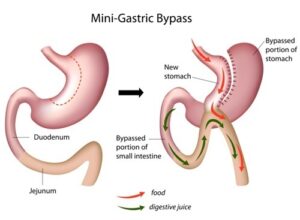Laparoscopic mini gastric bypass Surgery
A gastric bypass will help you to lose weight in two ways – firstly, by reducing the size of your stomach to restrict how much you can eat, and secondly, by bypassing a large part of your intestines to reduce the amount of food and, therefore calories, that can be absorbed. Rerouting of the food stream also produces changes in gut hormones that reverse one of the primary mechanisms by which obesity-induced type 2 diabetes occurs.
We offer two types of gastric bypasses – the Roux-en-Y bypass and the newer procedure, the mini bypass. Our surgeon will be able to advise you on which procedure will be better suited for you based on your unique set of circumstances. Generally speaking, the mini-gastric bypass is quicker, technically easier and carries a lower complication rate compared to traditional gastric bypass surgery.

We offer the mini gastric bypass in Dubai performed by means of laparoscopic surgery. This type of minimally invasive surgery, also known as keyhole surgery, is done through small incisions with the help of a camera. In addition to smaller scars, other advantages are less internal scarring, quicker healing and a shorter recovery time.
The results of the classic Roux-en-Y bypass and the mini-bypass are identical over 3 to 5 years.
How it works
The mini-gastric bypass is performed by keyhole surgery under general anesthesia. Our surgeon will make four to five small incisions (about 5mm-12mm long) in your abdomen. Using special laparoscopic (keyhole surgery) instruments, he will staple the top of the stomach so that part of it forms into a thin tube (30ml to 50ml in size). The thin tube becomes the new stomach and is isolated from the rest of the stomach.
This new stomach is then attached to a loop of the small intestine. In this way approximately 150–200cm of the bowel is bypassed. The bypassed intestine and the rest of the stomach stay in the body, but they are no longer used for food digestion.
Risks and Complications
As is the case in any type of surgery, the mini-gastric bypass has a risk profile that you should know before proceeding. While complications such as anemia, or having to use food supplements can occur, they are rare and 90–95% of patients have no issues. Our surgeon will discuss the risk and complications with you and answer any questions you may have.

























